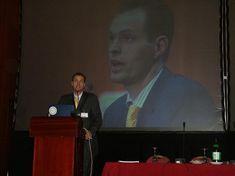
EurepGAP’s announcement that it has reorganised its fee structure has been met with concern by some operators within the industry.
Certification fees for the global standard required by many retailers as a condition of supply in Europe, especially the UK, have increased with the aim of making the scheme more equitable.
The manager of the Assured Produce Scheme in the UK, Liz Kerrigan said: “We are very concerned about any cost increase for our members and we will have to look very carefully at the value and the reason why. Our board has not yet had the chance to sit down and consider the implications of the restructure for us as a benchmarked scheme.”
The Pesticides Initiative Programme of ColeACP which works with a large number of small producers in African, Caribbean and Pacific countries, said it would be considering the implications of the new structure with its board members “very carefully” before the end of the month, as the issues were “very sensitive”, according to a spokeswoman.
Making the announcement, the board of EurepGAP also unveiled a short-to-medium term activity plan drawn up as a result of comments from those involved in the scheme. “The transformation of EurepGAP into a truly global standard means that we are faced with additional responsibilities to maintain high levels of service to our members but most importantly to ensure the consistency of the application of the certification standard wherever it is used, said Kristian Möller, EurepGAP md. “Members frequently state this as a key priority for EurepGAP.
“To meet these obligations EurepGAP has increased its certification fees which are currently charged through the certification body. We believe it provides a more equitable fee structure with smaller farms paying less and larger farms paying more.”
Möller explained that the increase is the first for the producer end of the supply chain in the 10-year history of EurepGAP and that it comes from a low base cost. Retailer fees are reviewed and increased more regularly. The last increase was two years ago.
“Naturally we appreciate any increase cannot be regarded as favourable but do so after careful consideration,” said Möller.
Comparisons with previous fee-levels are difficult, as the structure has been changed so much. But it is now possible for very small farms - with less than a hectare under production - to pay as little as €3 in farmer registration fees and a maximum has been set for single farm operations with several different product scopes, and for farms over 200ha of €100.
“A lot of small-holders need to increase their investment into their own operations so we don’t want to take money out of those groups, therefore this restructure is fairer,” said Möller.
The new structure is required to help EurepGAP maintain the trust in its standards and to respond to trade globalization which means it now operates in more than 70 countries across five continents with the recent addition of a Japanese supermarket to its ranks.
The new structure can be viewed at www.eurepgap.org